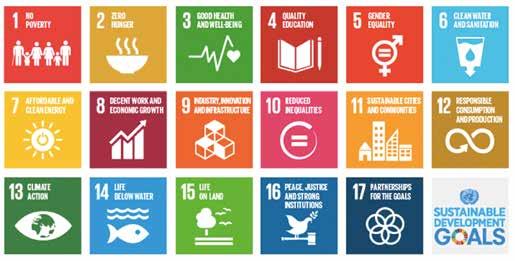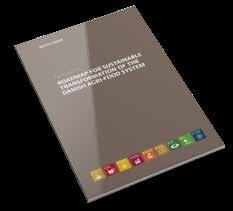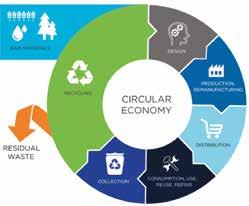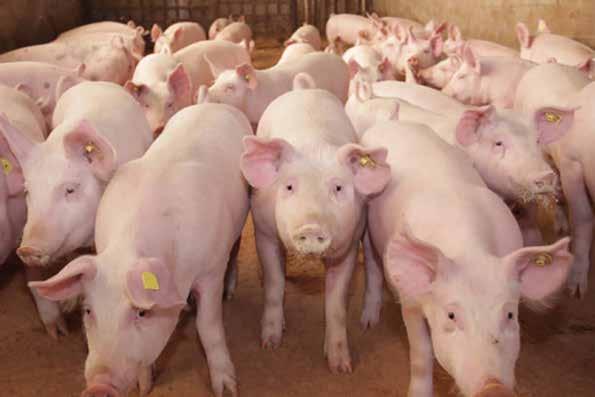
6 minute read
SUSTAINABILITY
Enhanced sustainability will nurture long term profitability
Paul Smith assesses progress in this country and Denmark
Those passionately involved in addressing the everyday challenges of running a modern business, understandably, tend not to prioritise the need to adopt radical unprecedented changes which might be sneakingup on their business model. A sharp focus on ‘the here and now’ and commercial survival usually has to dominate the thinking. Times have changed. The UK pig industry, increasingly, has to operate within a global marketplace and social responsibilities are becoming an issue for corporate strategists. The United Kingdom is one of 178 countries signed-up to the United Nations 2030 Agenda For Sustainable Development. At its heart are 17 wide-ranging Sustainable Development Goals (SDGs).
Objective 12 is about Responsible Production and Consumption whereas objective 13 is concerned with Climate Action. Like it or not, both these objectives will have a major influence on how pigs are produced in the future. We have a head start. Already the UK pig industry has embraced the change in social attitudes regarding pig welfare. It is recognised as a shining light because of the emphasis on more pig friendly production systems and the sensitivities of the 21st century’s customer base. Furthermore, sustainability has become an enhanced focus for the whole of the pork chain and pig producers will have to take some ownership of this global need.
Since the Covid pandemic, market research has shown that consumer concerns about sustainability issues have ascended the priorities list. In developed countries this has resulted in a changed approach to investment strategies. It is not only an ethical issue. Shrewd investors are now starting to acknowledge that companies with a strong focus on sustainability will become the companies more likely to deliver long term profitability. Accountants Price Waterhouse Coopers suggest that by 2025 as much as 75% of global gross domestic production could be >>
committed to carbon neutrality. These societal changes will rattle the pork chain and pig producers will sooner or later feel it tightening.
Already EU countries are being incentivised to embrace sustainability challenges and opportunities. The EU Innovation Fund is one of the world’s largest funding programmes for the demonstration of low carbon innovations. It’s meant to kick-start new thinking. This money-pot is available to encourage EU members to invest in clean energy. Furthermore, it aims to boost domestic growth, create future-proof jobs and reinforce European technological leadership on a global basis. Put another way it’s an incentive offered for ‘club members’ in a club in which the UK no longer has membership. Those familiar with the forwardlooking Danish pig industry will not be surprised to hear that SEGES, the Danish Agriculture and Food Council has made an early and game-changing commitment to this global priority. It intends to be a big player in the ‘circular economy’ i.e. engage a model of production and consumption, which involves sharing, leasing, reusing, repairing, refurbishing and recycling existing materials and products as long as possible.
Denmark aims to be the world leader in the circular economy by 2030. It will nurture a newlook pig industry which tackles these key global challenges such as loss of biodiversity, waste minimisation and enhanced production efficiency. Despite the country’s imbalance between pigs and people, reducing the size of the national pig herd is not on the agenda. Circularising its economy is regarded as the gateway to becoming an even bigger global player in pig production. Denmark has already set-up a Roadmap For Sustainable Transformation of the Danish Agri-Food System.
Reducing home production of food will have little impact on global sustainability concerns.
However, in its role as a huge exporter of food, its focus is on the bigger picture. Not only will Denmark aim to become a test-bed for enhancing the sustainability of food for home production, by concentrating its research on sustainability, the country will acquire new knowledge that can be used all over the world. There is both a need and an opportunity because by 2050 the global demand for food is likely to be 45% up on current levels. As nations become more affluent, their meat consumption increases. Meanwhile those in the more affluent countries are likely to eat meat ‘differently.’ In order to address these issues, there will need to be a closer link between research and manufacturing so that the lag time between innovation and commercial implementation will be reduced.
The Danish ‘Roadmap’ emerged via the Danish Innovation Fund which brings together research, technology development and innovation grant applications. Over 300 university departments and research establishments contributed to the Roadmap to secure the EC grant. An online webinar recently attracted 400 participants, many of whom were from distant countries which reflected the global interest in sustainability. Priorities for the pig industry involved greenhouse gas reduction via more emphasis on using sustainable feed inputs and effective feed supplements. The potential to reduce noxious gases by more frequent or the immediate discharge of slurry combined with more use of additives in stored slurry and robotic cleaning strategies were also discussed. There was some mention of controlling the exhaust fumes from covered tanks, all part of the goal to reduce the carbon footprint by 25% come 2030. These developments are likely to be linked to demonstration facilities to encourage accelerated



uptake. A target of reducing protein inputs by 30% by 2030 has been set. It is likely that in part this will be achieved via plant breeding and protein production from both green and marine biomasses.
What has been the response in the UK to the challenge for its agriculture needing to become more sustainable? The scope for input from research establishments is limited following their demise in recent years. However, the strategy involves’ The Sustainable Farming Incentive’ which is a new government scheme that rewards environmental land management. Its main objectives are:
1. Maintaining and enhancing the natural environment 2. Reducing carbon emissions 3. Improving the health and welfare of farmed animals.
DEFRA launched a pilot project on selected farms in October 2021. Starting in April 2022, the scheme will be available to all farmers who currently receive the land-based Basic Payment Scheme. At this stage, the main benefits to pig keepers will be via the Animal Health and Welfare Pathway, which will fund a yearly visit from a vet, or vet-led team. It will be a time-limited offer for three years. In particular, pigs will be tested to monitor herds for porcine reproductive and respiratory syndrome virus (PRRS). It’s still early days in this late started initiative, but more standards are intended to be added into the Sustainable Farming Incentive scheme between 2022 and 2024. No doubt the Government is already bending a listening ear to single-agenda vegans and vote-winning bird watchers. So far, uptake by farmers i.e. those who produce food and are eligible for the pilot scheme of DEFRA’s Sustainable Farming Incentive, has been pathetically low. The National Audit Office logs it at just five per cent. The Government has presented it as a new opportunity to gain a green-washed National Service badge.
The degree of urgency and importance of joined-up thinking towards a more sustainable home-based future-proof farming system seems disappointingly lightweight. In particular, those involved in pig production with a limited land area have been side-stepped and opportunities to work for the common good have been squandered. Maybe those who understand the pig industry best, belatedly should be rattling the DEFRA cage somewhat vigorously.
The UK pig industry has a commendable survival and self-help track record. In order to deliver more sustainable lean meat production it will certainly have to push these qualities to the absolute limit. The innovators and early adopters will have a lot on their plate and will need to work even more closely with universities, what remains of our research base and the most forward-looking manufacturers. Meanwhile the NFU suggests “You can’t be green if you’re in the red.”








